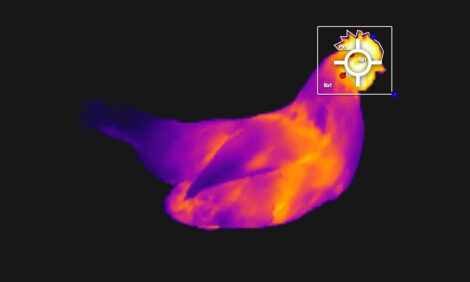



Effect of Maternal Vitamin D Source on Broiler Hatching Egg Quality, Hatchability and Progeny
A reduction in embryonic mortality was observed in a field trial in Canada when broiler breeders received additional 25-hydroxy vitamin D in the drinking water but the long-term effects were negligible on the performance or bone strength of the offspring.Vitamin D is involved in calcium metabolism as well as bone and shell quality and it is, therefore, important to broiler breeders, according to Jennifer Saunders-Blades and Doug Korver of the University of Alberta in Canada.
In their research, published in the Journal of Applied Poultry Research, they explain how they investigated the effects of maternal dietary 25-OH vitamin D3 on broiler breeder egg quality and hatchability, as well as on progeny bone mineral density and performance.
In a field study, all hens were fed 3,000IU of vitamin D3 (D) per kilogram of complete feed; in addition, half of the hens also received 34.5µg of 25-OH vitamin D3 per litre in the drinking water (25OHD).
Eggs from each treatment group were incubated and hatched; chicks were fed a common diet and grown to 41 days of age.
Eggs from hens in the 25OHD treatment had a nearly 30 per cent reduction in early embryo mortality. However, a larger egg size resulted in greater chick bodyweight for the D chicks, although this did not affect broiler production performance.
Broilers from the maternal 25OHD treatment had a lower feed conversion ratio during the grower phase.
Unexpectedly, chick plasma 25-OH vitamin D3 was only greater for the maternal 25OHD treatment at four days of age but not at hatch, 2, 6, 8, 10, 12 or 14 days of age.
Maternal vitamin D3 source did not affect progeny 41-day bone mineral density.
Maternal 25-OH vitamin D3 had a protective effect on the growing embryo, reducing early embryonic mortality, with minimal effects on progeny performance and bone mineral density to processing at 41 days of age, concluded Saunders-Blades and Korver.
They suggest that the previously reported effects of 25-OH vitamin D3 on increasing broiler performance and breast yield seem to be dependent on supplementation of the broiler diet; a carry-over effect of maternal supplementation is insufficient to achieve these effects in their experiment.
Reference
Saunders-Blades J.L. and D.R. Korver. 2014. The effect of maternal vitamin D source on broiler hatching egg quality, hatchability, and progeny bone mineral density and performance. J. Appl. Poult. Res. 23(4): 773-783. doi: 10.3382/japr.2014-01006
December 2014








